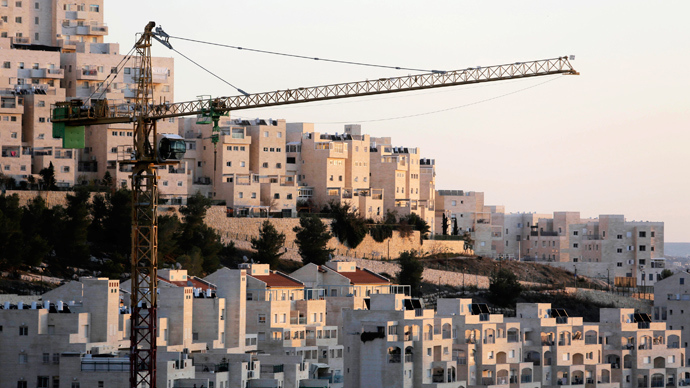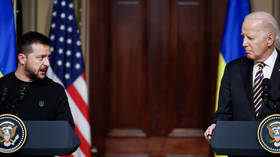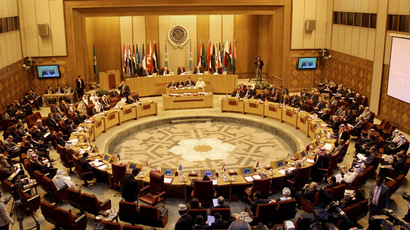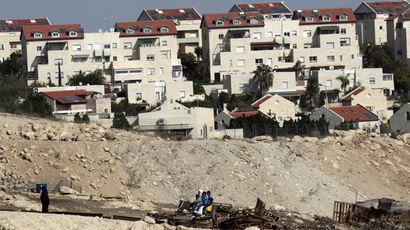Israel plans 1,400 new homes in occupied territories amid fragile peace talks

Israel has published tenders for 1,400 new homes in the occupied West Bank and East Jerusalem, once again putting the US-brokered push for a peace deal between the Jewish state and the Palestinians under threat.
The announcement was expected in December, after Israel freed 26 long-serving Palestinian prisoners as part of the US-brokered deal to secure the resumption of peace negotiations between the sides.
However, it was delayed till Friday in order to allow US
Secretary of State John Kerry to conclude his visit to the
region.
The American effort saw Israel and Palestine returning to the
negotiation table after a three-year break in July last year. The
talks are set to last until April.
But the Palestinians have numerous times warned that the
expansion of settlements in territories, which Israel captured in
the 1967 Middle East war, could derail the peace process.
According to the list by Israel's Housing Ministry, 801 housing
units are planned to be constructed in the West Bank and another
600 in Jewish neighborhoods in East Jerusalem.
The ministry also re-issued tenders for 582 homes in East
Jerusalem, which previously failed to attract bids from
contractors.
Anti-settlement watchdog, Peace Now, said that in the six months
since the resumption of the peace talks, Israel has already
announced plans for 5,349 new homes in the occupied territories.
“These latest tenders could cause negotiations to break down
and destroy Kerry's efforts,” Yariv Oppenheimer, Peace Now
general secretary, is cited as saying by Reuters.

The Palestinians, who want to build an independent state in East Jerusalem, the West Bank and the Gaza Strip, abandoned by Israel in 2005, see settlements as a major obstacle.
It was the settlements issue, which led to a breakdown of the previous round of talks between the sides back in 2010.
Israeli Prime Minister Benjamin Netanyahu has defended the recent expansion, saying the tenders deal with homes in blocs that would remain Israeli under any future peace accord.
Despite a major part of the international community considering settlements in the West Bank and East Jerusalem illegal, over 500,000 Jewish settlers live in the occupied territories.
Israeli Arabs outraged by foreign minister’s plan
A proposal that some of the towns and villages of Israel’s Arab
minority should be handed over to a future Palestine in exchange
for parts of the West Bank where Jewish settlers reside, may also
hamper the peace process.
According to AP, the idea came from Israeli Foreign Minister
Avigdor Lieberman, who is known as the leading voice in the
country’s so-called nationalist camp, which is skeptical about
the idea of even talking to the Palestinians.
Lieberman reputedly stressed that he won’t support any peace deal
brokered by US Secretary of State John Kerry, if it doesn’t
include his demand.
Nobody will be uprooted from their homes as the border will
simply be adjusted to put Arab towns inside Palestinian
territory, the FM said.
However, the proposal was rejected by all the interested parties,
which are the Palestinians, the Israeli Arabs and top Israeli
politicians.
The Israeli Arabs “are citizens of Israel and stayed in their
historical home land and no one has the right to change their
reality," Mohammad al-Madani from Palestine’s ruling Fatah
party told AP. “The right wing Israeli wants to get rid of
those people just because they are Arabs.”

According to former adviser to Yasser Arafat, Ahmad Tibi, current Palestinian president, Mahmoud Abbas, said Lieberman’s proposal didn’t come up during the peace talks and would have been immediately rejected if it had.
“Citizens are not chess pieces to be moved around at will and this just heightens our sense of estrangement from the state," Tibi stressed.
Mohammad al-Madani, a member of Abbas' Fatah party, said that
while the movement represents Palestinians all over the world,
Israeli Arabs were "a special case."
Israeli President Shimon Peres and Interior Minister Gideon Saar
have rejected the FM’s plan, with Prime Minister Netanyahu making
no public comments on it.
Israel's Arabs represent about 20 percent of the country’s
population of 8 million people.
They come from those, who decided to remain in the Jewish state
upon Israel's establishment in 1948, in contrast to hundreds of
thousands of Palestinians who fled or were driven away.
West Bank landfill dispute
Israel is also reportedly blocking the operations of a brand-new
landfill, which was funded by the World Bank to serve the
Palestinian population of Jerusalem, Haaretz wrote.
The country’s Civil Administration demands the Jewish settlements
in the area be allowed to use the waste deposit as well, the
paper said.
The Al-Minya landfill was built east of Bethlehem over the last
two years, but with the facility situated in the Israeli
controlled West Bank’s Area C, it required the Civil
Administration’s approval for construction.
It’s the first modern landfill in the southern West Bank, which
has the capacity of sealing the earth to prevent waste from
leaking into the ground waters.
Anti-settlement activist, Dror Etkes, told the Haaretz newspaper
that he learned from one of the Al-Minya operators that the
site’s construction is complete, but the Civil Administration is
preventing it from working.
The Israeli authorities claim the Palestinians went back on the
deal for the site to be operated as a regional landfill, despite
the World Bank making it clear last year that Al-Minya should be
used for Palestinian purposes only.
With the dispute ongoing, waste in the area is being dumped at
environmentally hazardous private landfalls, or simply burnt in
the streets.














